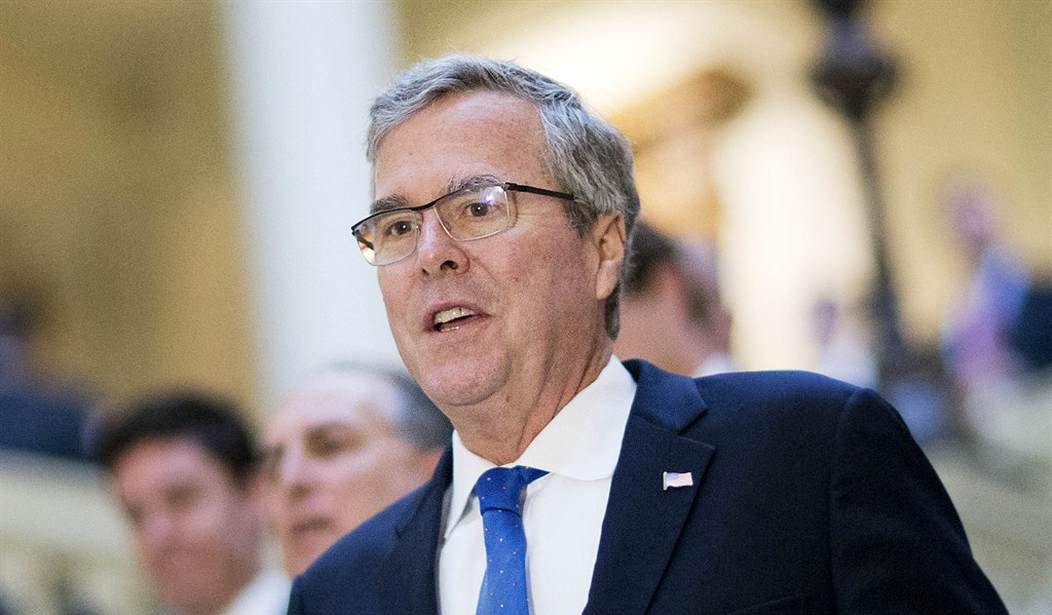For many conservatives, the fight against Obamacare has been the defining battle of President Obama's years in the White House. For them, and probably a majority of the Republican base, fighting first against the passage of the Affordable Care Act and later pressing to repeal it have been so important because: A) they strongly oppose the substance of the law, and B) they see opposition to Obamacare as the best way to resist the president's overall expansion of government.
That the struggle has so far been a losing one has not changed the fact that conservatives require their presidential candidates to have solid anti-Obamacare bona fides.
Recently a well-known conservative activist, recalling the GOP effort to stop the Affordable Care Act in 2009 and 2010, asked: Where was Jeb Bush? I don't remember him being there when we were doing everything we could to derail Obamacare.
"A big vulnerability for the governor, when the debates start, is to remind us again, where were you during the battle over Obamacare?" noted that activist, Gary Bauer, of the conservative group American Values. "I don't recall much (from him) during those years. I don't think not being a veteran of those wars is a plus for Gov. Bush."
Bauer is basically right. In 2009 and early 2010, as Obamacare made its troubled way through Congress, Bush -- a respected former two-term Republican governor of Florida with solid conservative credentials -- remained mostly silent about the biggest public policy fight in a generation.
Bush statements that even tangentially touched on the Affordable Care Act were few and far between. In March 2009, for example, as the battle was just beginning, Bush penned an op-ed calling for conservatives to be the "loyal opposition" in the face of far-reaching Democratic initiatives. He added: "Simply opposing the massive encroachment of government into health care won't solve the problem of affordability of health insurance for many Americans."
Recommended
A couple of months later, in May 2009, when Bush joined fellow Republicans Eric Cantor and Mitt Romney on a "listening tour" Bush said: "It's time for us to listen first, to learn a little bit, to upgrade our message a little bit and to not be nostalgic about the past. You can't beat something with nothing, and the other side has something. I don't like it, but they have it and we have to be respectful and mindful of that."
That's pretty much it for 2009 and early 2010, as the health care battle raged on Capitol Hill.
"He wasn't in Congress," Bush spokesman Tim Miller said when I asked what the former governor was doing in 2009 as far as Obamacare was concerned. "He did not have a very big footprint as a guy on the cable news circuit in the years after he left the governor's office. He was focused on business."
One part of Bush's business was a lucrative seat on the board of directors of the hospital giant Tenet Healthcare. Bush joined the company after leaving the governor's office and was paid more than $2 million for his services between 2007 and last year, when he resigned to run for president. Tenet strongly supported the passage of Obamacare and has profited enormously from it.
I asked Miller whether Bush's near-silence on Obamacare was the result of his place on the Tenet board. "Absolutely not," Miller said. "He forcefully advocated against it in board meetings, to the point that it bubbled up in public. When asked about it, he was very clear that he was in opposition to it."
What Miller meant by "bubbled up in public" was a line in a New York Times article in 2014 -- years after Obamacare became law -- which reported: "Tenet's chief executive, Trevor Fetter, said Mr. Bush had made no secret of his objections to the health care overhaul at company meetings. But (Fetter) suggested that Mr. Bush understood the difference between 'personal views and what is best for the company.' Mr. Fetter predicts that in 2014, the Affordable Care Act will deliver up to $100 million in new earnings for Tenet."
Bush did not remain silent forever. On March 22 -- the day after Obamacare finally, officially passed the House and Senate and headed to the president's desk for signature -- Bush spoke out forcefully against the new law. Appearing on Fox News, he called Obamacare a "major overreach" and a "huge new entitlement" and a "massive tax increase" that would "play out in the future by giving up our own freedom and put it in the hands of government." With the 2010 elections approaching, Bush predicted "a massive uprising against this government takeover of our lives."
It was a tough, far-ranging indictment -- delivered the day after the bill had been safely passed into law.
Later in 2010, Bush campaigned, raised money for, or endorsed several Republican candidates who advocated repealing Obamacare -- among them Jim DeMint, Pat Toomey, Rand Paul, Rob Portman, Raul Labrador, Brian Sandoval, John Kasich, Mary Fallin, Nikki Haley, Scott Walker, and others, according to Miller.
More recently, as a presidential run has neared, Bush has sharpened his critique of Obamacare. In a late 2013 appearance on ABC, he called the health law "flawed to its core." This month, in Iowa, he called it a "monstrosity."
But that is now. Back when it was all on the line, and Republicans were gathering their forces in a desperate attempt to stop Obamacare, Jeb Bush mostly held his tongue.

























Join the conversation as a VIP Member